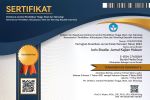Analisis Yuridis Atas Penggunaan Animasi Kartun Terkenal Sebagai Merek Di Indonesia (Studi Putusan Mahkamah Agung Nomor 1105 K/Pdt.Sus-HKI/2018)
Abstract
Keywords
Full Text:
PDFReferences
Bone, Robert G. (2008). “Schecter’s Ideas In Historical Context and Dilution Rocky Road”, Santa Clara High Technology Law Journal 24 Issue 3.
Derenberg Walter J. (1956). “The Problem of Trademark Dilution and the Antidilution Statutes”, California Law Review 44, Issue 3.
Faradz, Haedah. (2008). “Perlindungan Hak Atas Merek”, Jurnal Dinamika Hukum, 8 No. 1.
Gautama, Sudargo. (1977). Hukum Merek Indonesia, Bandung, Alumni.
Jened, Rahmi. (2007). Hak Kekayaan Intelektual: Penyalahgunaan Hak Ekslusif, Surabaya: Airlangga Universiti Press.
Koto, Ismail, and Taufik Hidayat Lubis. 2021 "Tindak Pidana Penyelundupan Pakaian Bekas Dalam Perspektif Teori Kepastian Hukum (Studi Kasus Di Kantor Bea Cukai Teluk Nibung Tanjung Balai)." Buletin Konstitusi 2.1.
Koto, Ismail. 2021 "Kewenangan Jaksa Dalam Melakukan Penggabungan Perkara Korupsi Dan Money Laundering (Studi Kejaksaan Tinggi Sumatera Utara)." Iuris Studia: Jurnal Kajian Hukum 2.2.
Kurniasih, Dwi Agustine. (2008). “Perlindungan Hukum Pemilik Merek Terdaftar Dari Perbuatan Passing Off (Pemboncengan Reputasi)”, Media HKI Buletin Informasi dan Keragaman HKI, V No. 6.
Ramadhani, Rahmat. (2020). “Legal Consequences of Transfer of Home Ownership Loans without Creditors' Permission”, IJRS: International Journal Reglement & Society 1, No. 2.
Ramadhani, Rahmat. (2020). “Peran Poltik Terhadap Pembangunan Hukum Agraria Nasional”, SOSEK: Jurnal Sosial dan Ekonomi 1, No. 1.
Zainuddin dan Rahmat Ramadhani. (2021). “The Legal Force Of Electronic Signatures In Online Mortgage Registration”, Jurnal Penelitian Hukum De Jure 21, No. 2.
DOI: https://doi.org/10.55357/is.v2i2.135
Refbacks
- There are currently no refbacks.

This work is licensed under a Creative Commons Attribution 4.0 International License.
Iuris Studia: Jurnal Kajian Hukum published by BUNDA MEDIA GRUP is abstracting & indexing in the following databases:
licensed under a Creative Commons Attribution-ShareAlike 4.0 International License










